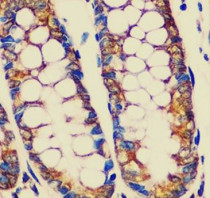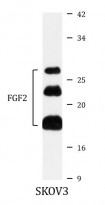ARG43336
anti-FGF basic antibody
anti-FGF basic antibody for IHC-Formalin-fixed paraffin-embedded sections,Western blot and Human,Mouse,Rat
Overview
| Product Description | Rabbit Polyclonal antibody recognizes FGF basic |
|---|---|
| Tested Reactivity | Hu, Ms, Rat |
| Tested Application | IHC-P, WB |
| Host | Rabbit |
| Clonality | Polyclonal |
| Isotype | IgG |
| Target Name | FGF basic |
| Antigen Species | Human |
| Immunogen | Synthetic peptide derived from Human FGF basic. |
| Conjugation | Un-conjugated |
| Alternate Names | FGF-2; Fibroblast growth factor 2; bFGF; FGFB; Heparin-binding growth factor 2; BFGF; HBGF-2; Basic fibroblast growth factor |
Application Instructions
| Application Suggestion |
|
||||||
|---|---|---|---|---|---|---|---|
| Application Note | * The dilutions indicate recommended starting dilutions and the optimal dilutions or concentrations should be determined by the scientist. | ||||||
| Positive Control | SKOV3 | ||||||
| Observed Size | 27, 23 and 18 kDa |
Properties
| Form | Liquid |
|---|---|
| Purification | Affinity purified. |
| Buffer | PBS (pH 7.3), 0.02% Sodium azide, 50% Glycerol and 0.05% BSA. |
| Preservative | 0.02% Sodium azide |
| Stabilizer | 50% Glycerol and 0.05% BSA |
| Storage Instruction | For continuous use, store undiluted antibody at 2-8°C for up to a week. For long-term storage, aliquot and store at -20°C. Storage in frost free freezers is not recommended. Avoid repeated freeze/thaw cycles. Suggest spin the vial prior to opening. The antibody solution should be gently mixed before use. |
| Note | For laboratory research only, not for drug, diagnostic or other use. |
Bioinformation
| Database Links | |
|---|---|
| Gene Symbol | FGF2 |
| Gene Full Name | fibroblast growth factor 2 (basic) |
| Background | The protein encoded by this gene is a member of the fibroblast growth factor (FGF) family. FGF family members bind heparin and possess broad mitogenic and angiogenic activities. This protein has been implicated in diverse biological processes, such as limb and nervous system development, wound healing, and tumor growth. The mRNA for this gene contains multiple polyadenylation sites, and is alternatively translated from non-AUG (CUG) and AUG initiation codons, resulting in five different isoforms with distinct properties. The CUG-initiated isoforms are localized in the nucleus and are responsible for the intracrine effect, whereas, the AUG-initiated form is mostly cytosolic and is responsible for the paracrine and autocrine effects of this FGF. [provided by RefSeq, Jul 2008] |
| Function | Acts as a ligand for FGFR1, FGFR2, FGFR3 and FGFR4 (PubMed:8663044). Also acts as an integrin ligand which is required for FGF2 signaling (PubMed:28302677). Binds to integrin ITGAV:ITGB3 (PubMed:28302677). Plays an important role in the regulation of cell survival, cell division, cell differentiation and cell migration (PubMed:8663044, PubMed:28302677). Functions as a potent mitogen in vitro (PubMed:3732516, PubMed:3964259). Can induce angiogenesis (PubMed:23469107, PubMed:28302677). [UniProt] |
| Cellular Localization | Secreted. Nucleus. Note=Exported from cells by an endoplasmic reticulum (ER)/Golgi-independent mechanism. Unconventional secretion of FGF2 occurs by direct translocation across the plasma membrane. Binding of exogenous FGF2 to FGFR facilitates endocytosis followed by translocation of FGF2 across endosomal membrane into the cytosol. Nuclear import from the cytosol requires the classical nuclear import machinery, involving proteins KPNA1 and KPNB1, as well as CEP57. [UniProt] |
| Calculated MW | Isoform 1: 31 kDa Isoform 2: 23 kDa Isoform 3: 17 kDa Isoform 4: 21 kDa |
| PTM | Phosphorylation at Tyr-215 regulates FGF2 unconventional secretion. Several N-termini starting at positions 94, 125, 126, 132, 143 and 162 have been identified by direct sequencing. [UniProt] |
Images (2) Click the Picture to Zoom In
-
ARG43336 anti-FGF basic antibody IHC-P image
Immunohistochemistry: Paraffin-embedded Human colon tissue stained with ARG43336 anti-FGF basic antibody at 1:100 dilution.
-
ARG43336 anti-FGF basic antibody WB image
Western blot: 25 µg of SKOV3 cell lysate stained with ARG43336 anti-FGF basic antibody at 1:1000 dilution.







